Way back in 2010 (and then again in 2012) I wrote about a bizarre belief that cornmeal could be used to treat fungal diseases, from lawn spot to athlete’s foot. Rather than rehash what’s already been written, I’ll invite readers to read those posts for background. And of course look at the comments, which are…interesting.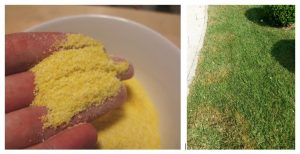 The weird thing is that this post from 2010 is the single most popular post on the blog. (Our stats are only for the last two years since we migrated the web site – who knows how many there were before May 2017?)
The weird thing is that this post from 2010 is the single most popular post on the blog. (Our stats are only for the last two years since we migrated the web site – who knows how many there were before May 2017?)

The consistent popularity for the topic spurred me to publish a university fact sheet on the use of cornmeal and corn gluten meal in home landscapes and gardens. This fact sheet reviews the pertinent literature, and makes recommendations that are pretty much the same as those I made almost 10 years ago. Nothing has changed in the research world to support cornmeal as a fungicide.
But wait, there IS something that’s happened since 2010! Now cornmeal is being touted as an insecticide! In fact, if you go to Google and search for “cornmeal” and “insecticide” you’ll find thousands of hits. As you might expect, there’s no research to support this notion: researchers in Maine, for instance, found no effect of cornmeal on fire ants. However, it is used as a bait to deliver actual insecticidal chemicals.
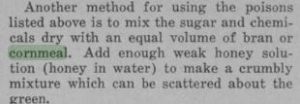
But facts don’t get in the way of home remedies, such as Lifehacker’s eyebrow-raising advice.
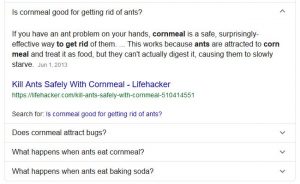
By refining the search to only include university websites (use “site:.edu” to do this), and swapping out “ants” for “insecticide,” you’ll find at least one Master Gardener group happily (and illegally) recommending cornmeal as an ant killer. The popular mode of action is either (1) they can’t digest cornmeal and starve or (2) the cornmeal absorbs water in their gut and they explode.
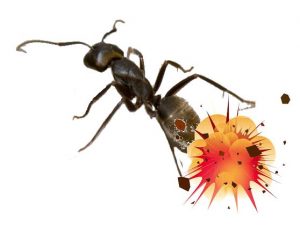
This reminds me of yet another food product – molasses – recommended for killing ants. Since you’re already here, you might as well check out Molasses Malarkey parts 1, 2, and 3 too.
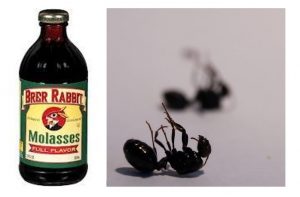 Might I recommend everyone use their cornmeal and molasses to make bread or cookies or pancakes? There are some delicious recipes on the internet.
Might I recommend everyone use their cornmeal and molasses to make bread or cookies or pancakes? There are some delicious recipes on the internet.

It’s not all that weird: corn gluten meal easily gets shortened to cornmeal. As a species, language gives us more than a few problems.
Corn gluten meal doesn’t have fungicidal or insectidal properties either. So it’s still weird becuase it’s based on….?
Thanks once again, for your patient explanation that corn meal (and corn gluten meal) has no fungicidal or insecticidal properties.
You’re welcome! This series of posts are still very popular. Hopefully it will get people thinking about what really makes sense (not just what the science shows).
Grits are what I see as an ant killer. It’s the “ants eat grits, the grits absorb water, and the ant explodes” version. I have been thrown out of 2 local gardening groups this year for posting the life cycle of ants to show how silly that is. You wouldn’t think that would be controversial. You would be wrong.
I was going with the life cycle of ants rather than other evidence like linking any kind of scientific study to avoid the knee jerk hostility that seems to elicit. Obviously, that didn’t work, either, but I did try.
When you challenge a core belief, no matter how outlandish it is, you get emotional pushback. Keep trying! Some people will listen and learn.
Since cornmeal comes from field corn, and it is sprayed with pesticides, could it be a false assumption that cornmeal “ doesn’t have insecticidal properties”?
Corn kernels are not sprayed with insecticide. They are protected by the husk.
Actually Shannon is on to something. Isn’t something like 90% of our corn a GMO corn. Such as BT corn, which has the insecticidal Bacillus thuringiensis protein in the plant tissue now? So yes it would likely have insecticide in it unless you were buying a non GMO brand? It may not explode them but maybe it could kill ants now.
The proteins made by the Bt genes certainly can end up in the corn kernels. Where it ends up during processing into corn meal (mainly carbohydrates), corn gluten meal (much of the protein), and other byproducts…I couldn’t tell you. But in any case it won’t kill ants – Bt proteins target a relatively small group of insects that does not include ants.